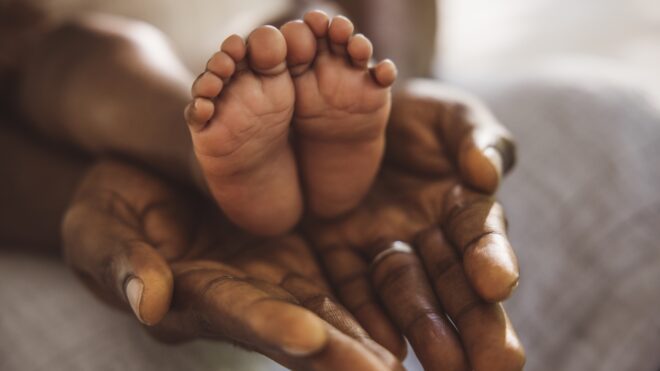Sara Walsh was pregnant with twins in 2021 when she discovered they had a rare condition that often results in pregnancy loss. She was referred to one of few doctors in her area who could treat it. The catch was she was required to pay thousands of dollars upfront so her babies could receive the life-saving care, reported NPR. Walsh was diagnosed with twin-to-twin transfusion syndrome, which requires fetoscopic laser surgery to treat. Walsh had health insurance, but the surgeon she was referred to was out of network. When the syndrome is left untreated, it results in pregnancy loss for 95% of patients.
Walsh has been seeking reimbursement for the treatment for well over a year now, and told NPR, “No parent should face the choice of 'How much money can I raise in the next 12 hours and is it enough to save the lives of my children?'”
More from CafeMom: Doctors Told My Husband They Were Operating to Save My Life & Not Our Unborn Baby's
The mother’s diagnosis left her no choice but to accept the out-of-network care, no matter the cost.
Walsh was 24 weeks pregnant with her twins when she started to suffer from extreme lower back pain that shortly led to a diagnosis of TTTS, which can cause cardiac problems for the fetuses, noted NPR. Walsh was reportedly told by her OB-GYN that she and her twins could die without receiving surgery quickly, and she was referred to a surgeon four hours away, who is considered an expert.
But she received a call from a billing representative stating that to see the surgeon, Dr. Ruben Quintero, she needed to pay upfront for a consultation, surgery, and postoperative care. The estimated total was $15,000. She reportedly put the majority of the amount on her and her mother's credit cards and managed to collect all the funds within 20 hours. "That 20 hours was just insanity," she told NPR.
More from CafeMom: Woman Gets Hit with $600 Bill for Her Stillborn Baby Who Only Lived for 3 Minutes
Her twins survived.
In a Facebook post for TTTS awareness, Walsh shared more about the diagnosis and how fortunate she is to have both of her girls. She explained that TTTS is not hereditary or genetic, but “random luck.” Walsh wrote, “identical twins stop evenly sharing the placenta inside the womb. This leads to a series of developmental disorders including growth restrictions and deadly blood flow issues. If undiagnosed, it can often be fatal. Early detection is key.”
“I was rushed for emergency fetal surgery in September in attempt to save their lives – early detection and treatment are critical. Caught early enough, you have about a 90% odd of saving one child, 75% odds of saving both — odds somewhat dependent on how skilled a surgeon you see. I am among the fortunate ones — both of my girls made it,” she continued.
No one can understand why she was charged so much upfront for treatment.
Walsh has been trying to get reimbursed for over a year, with various representatives trying to sort out the billing codes for her treatment, reported NPR. Walsh said, "No one understood how a doctor charged me more than $10,000 upfront to treat me," she told the news outlet.
Walsh has been partially reimbursed as her health plan later paid $5,419.44, but she still ended up paying more than $13,000 out of pocket as the total bill grew to $18,610.
Her story highlights the gap in health care and protection for out-of-network care.
Sadly, many patients like Walsh are put in situations with no options to compare doctors and pricing when a life-saving medical treatment is needed and requires out-of-network care, especially when it concerns a rare condition requiring a specialist.
There are reportedly only 30 to 40 hospitals in the US that can perform the surgery required to treat TTTS, according to Yale Medicine. Walsh said there was no time or option to find another surgeon. "There was no mention of shopping around," Walsh said.
Quintero wrote in a statement to NPR: "It would be impractical to join all health plans. If any patient is unable to pay in full for a procedure, we offer them CareCredit or an alternative payment plan, on a case by case basis." But neither option was available to Walsh.
Unfortunately, Walsh’s story highlights the need for federal protection and consumer protection to be in place to prevent similar situations from occurring.



